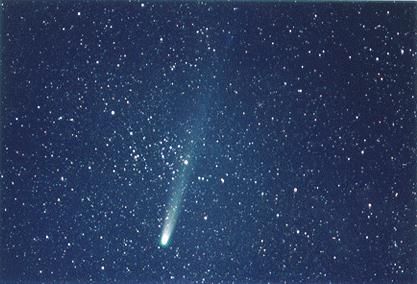Remembrance of a Portentous Eclipse

Fifteen years ago tonight, there was a total lunar eclipse that began before moonrise on the east coast, and was total until almost eight o'clock. (The time of greatest eclipse was after midnight on April fourth by Universal Time, but was on the third in Eastern Standard Time.) In New Hampshire, a clear sky along with the darkened moon and—in what was, with the lake still covered by ice, more late winter than early spring—very little light pollution locally created excellent conditions for viewing the Great Comet of 1996, Hyakutake, whose tail stretched across the stars as seen in this photograph taken from Vermont at the time. While I stood outside in the dark and the cold, gazing alternately at the momentarily red cloaked moon and the ephemerally bright comet, the most spectacular comet I have ever seen, I pondered: if eclipses and comets individually were omens to the ancients, what might their combination portend?
Not long after I had gone back into the warmth and artificial light of the house, my father’s brilliant life of better than eighty years quietly came to its end.
posted @ 05:49 AM EDT




